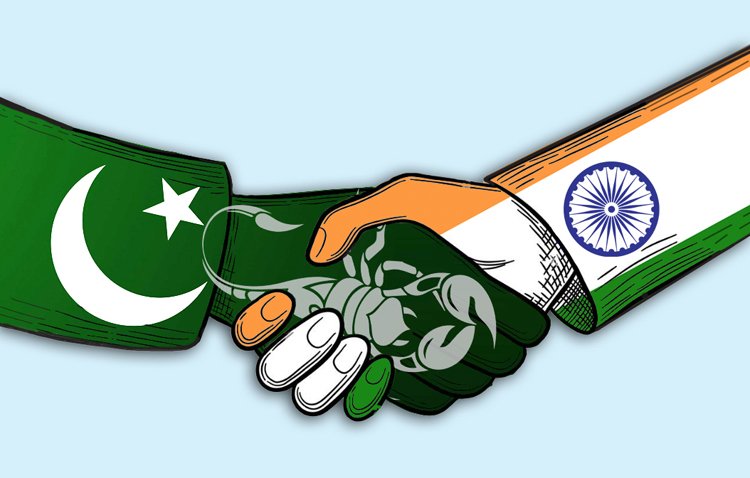Introduction
In a startling revelation that underscores the fraught history between Pakistan and India, former Pakistan Prime Minister Nawaz Sharif has publicly admitted that Islamabad violated an agreement with India in 1999. This admission pertains to the Lahore Declaration, signed by Sharif and then Indian Prime Minister Atal Bihari Vajpayee, intended to usher in an era of peace and stability between the two nuclear-armed neighbors. However, the subsequent Kargil conflict marked a significant breach of this agreement, highlighting the ongoing volatility and mistrust in Indo-Pak relations.

The Lahore Declaration: A Vision of Peace
On February 21, 1999, Nawaz Sharif and Atal Bihari Vajpayee signed the Lahore Declaration, a landmark accord aimed at reducing the risk of conflict and promoting mutual understanding between India and Pakistan. The agreement was seen as a major breakthrough, especially considering the historical animosities and frequent skirmishes that had plagued the relationship between the two countries since their independence in 1947. The Lahore Declaration emphasized maintaining peace and security, fostering economic cooperation, and enhancing people-to-people contact. It was a hopeful moment that suggested a new chapter in Indo-Pak relations.
The Kargil Conflict: A Breach of Trust
However, just a few months after the Lahore Declaration, the optimism of the agreement was shatter by the Kargil conflict. In the summer of 1999, Pakistani forces, under the direction of General Pervez Musharraf, infiltrated the Kargil district in Jammu and Kashmir. This clandestine operation aimed to cut off the vital Indian supply line to the Siachen Glacier and internationalize the Kashmir issue once more. The intrusion led to a full-scale war, with significant casualties on both sides, ultimately ending in India’s favor after intense fighting and international diplomatic pressure.
In a recent speech to the Pakistan Muslim League-Nawaz (PML-N) general council, Nawaz Sharif explicitly referred to this period, acknowledging Pakistan’s role in violating the Lahore Declaration. “On May 28, 1998, Pakistan carried out five nuclear tests. After that Vajpayee Saheb came here and made an agreement with us. But we violated that agreement…it was our fault,” Sharif admitted. This candid admission is significant, as it acknowledges Pakistan’s breach of the trust that was suppose to have been establish by the Lahore Declaration.

Political Ramifications and Personal Reflections
Sharif’s revelations were not limited to the Kargil conflict. He also reflect on his tumultuous political career and the events leading up to his ouster from office. Sharif was removed from the prime ministerial position in 2017 following a Supreme Court ruling on corruption charges, which he has consistently maintained were politically motivated. During his speech, he criticized the role of the judiciary and the military in destabilizing his government, specifically pointing to the former Chief Justice of Pakistan, Saqib Nisar, and the former ISI chief, General Zahirul Islam.
Sharif alleged that General Islam played a crucial role in orchestrating his removal to pave the way for Imran Khan’s rise to power. “I ask Imran not to blame us (of being patronized by the army) and tell whether Gen Islam had talked about bringing the PTI into power,” Sharif challenged. He recounted a specific incident from 2014, where General Islam purportedly demanded his resignation and threatened to “make an example” of him when he refused.
Nuclear Ambitions and International Pressure
Sharif also touched upon Pakistan’s nuclear ambitions and the international pressure they faced. He claimed that former U.S. President Bill Clinton had offered Pakistan $5 billion to forgo its nuclear tests in 1998, an offer Sharif rejected. “Had (former prime minister) Imran Khan-like person been in my seat he would have accepted Clinton’s offer,” Sharif remarked, emphasizing his steadfastness in pursuing Pakistan’s nuclear capabilities despite significant external pressure.
Pakistan was making his own Nuclear facility. Scientist name Abdul Qadeer Khan was also involve in this. India’s RAW (Research and Analysis Wing) Agents find it and tell it to world and They have to stop the illegal Nuclear Facility.

Implications for Indo-Pak Relations
Sharif’s admissions have profound implications for Indo-Pak relations. They not only validate India’s long-held position regarding the Kargil conflict but also underscore the internal political dynamics within Pakistan that influence its foreign policy. The breach of the Lahore Declaration is a stark reminder of the fragile nature of peace accords between the two nations. It also highlights the challenges any peace process faces, given the interplay of military ambition, political maneuvering, and historical grievances.
Moving Forward: Lessons and Challenges
The path to lasting peace between India and Pakistan remains fraught with challenges. Sharif’s candid acknowledgment of Pakistan’s actions in 1999 offers a rare moment of introspection. It suggests that for any meaningful progress, both nations must address past grievances with transparency and a commitment to uphold agreements.
The future of Indo-Pak relations hinges on the ability of both governments to move beyond historical animosities and engage in constructive dialogue. Trust-building measures, economic cooperation, and cultural exchanges could pave the way for a more stable and peaceful South Asia. However, this requires political will and a departure from the entrenched military strategies that have often dictated the relationship between the two countries.
Conclusion
Nawaz Sharif’s admission that “Pakistan violates agreement” is a significant moment in the history of Indo-Pak relations. It provides an opportunity for both nations to reflect on past mistakes and work towards a future where agreements like the Lahore Declaration are not just sign but faithfully implement. Only through such commitment can the cycle of conflict be broken, paving the way for enduring peace and stability in the region.
Also Read: Tragic Helicopter Crash: Iran President’s Death
Kyrgyzstan vs India: Rising Tensions and Safety for Students
Pinterest: Khabarey







